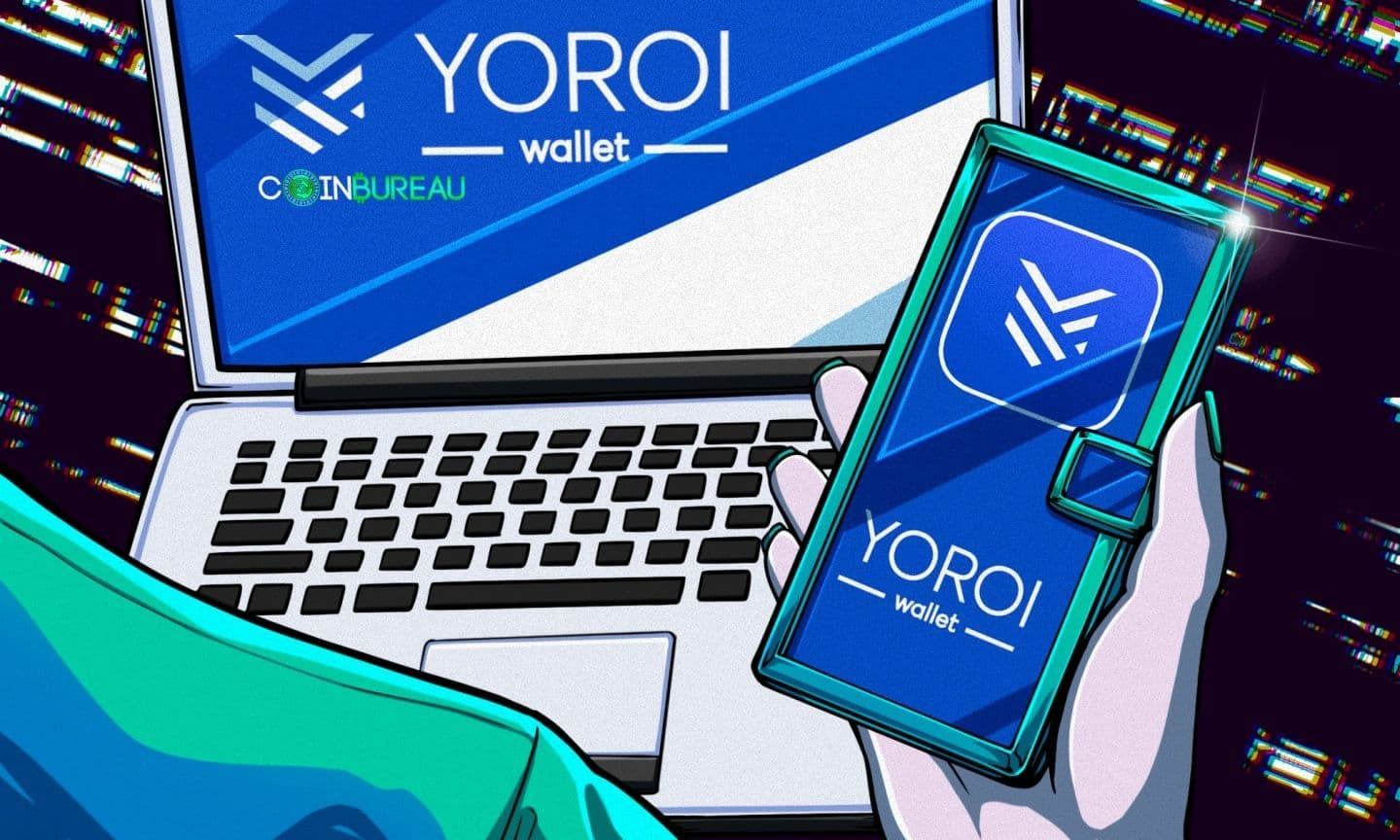Cardano is one of the most innovative and exciting blockchain projects in the space. Many users and investors are bullish and confident in the long-term success and adoption of the network. This is borne out by the over 2,000 Cardano projects and dapps thriving on the Cardano blockchain.
Many ADA holders are looking for a safe way to store their cryptocurrency as we wait to see what the future has in store for this promising project, which may be what brought you to this article today. This Daedalus wallet review will provide you with all the information you need to know to determine if the Daedalus wallet is right for you.
Disclaimer: I hold Cardano as part of my personal investment strategy.
What is the Daedalus Wallet?
Daedalus is a software wallet that can be downloaded onto a Mac, Linux, or Windows computer. Unlike most crypto wallets, Daedalus is a full-node hierarchical deterministic wallet, specifically for the use of assets on the Cardano blockchain.
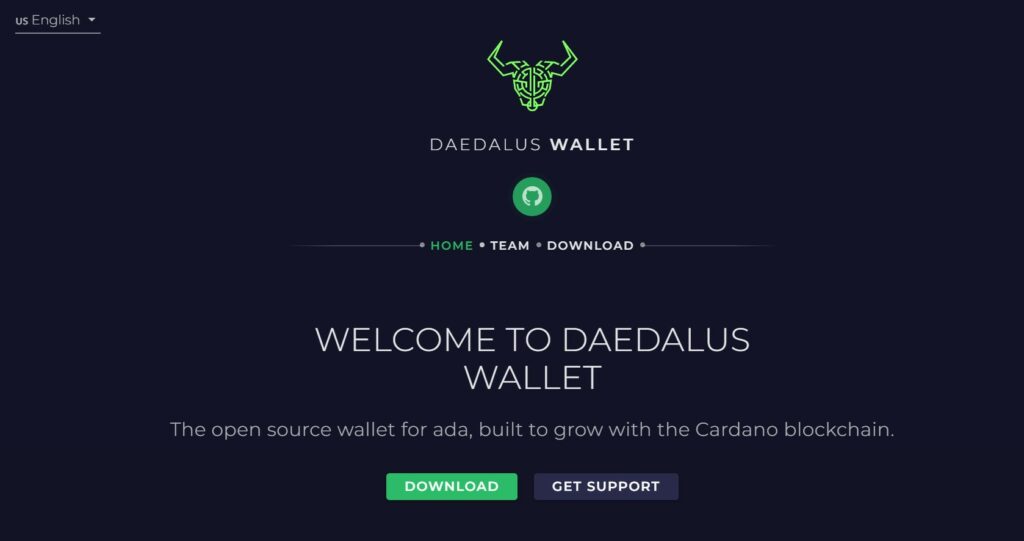 A Look at the Daedalus Homepage
A Look at the Daedalus HomepageWhat is meant by “full-node” is that the wallet is bundled with a full Cardano node, meaning it stores the entire history of the Cardano blockchain and validates blocks and transactions for a fully trustless and autonomous operation.
This is a great approach as the more users who download the Daedalus wallet, the more robust the Cardano network becomes. As more users install Daedalus, more nodes hold the network history and validate transactions, increasing the decentralization of the network and decreasing any single point of failure and centralization risk.
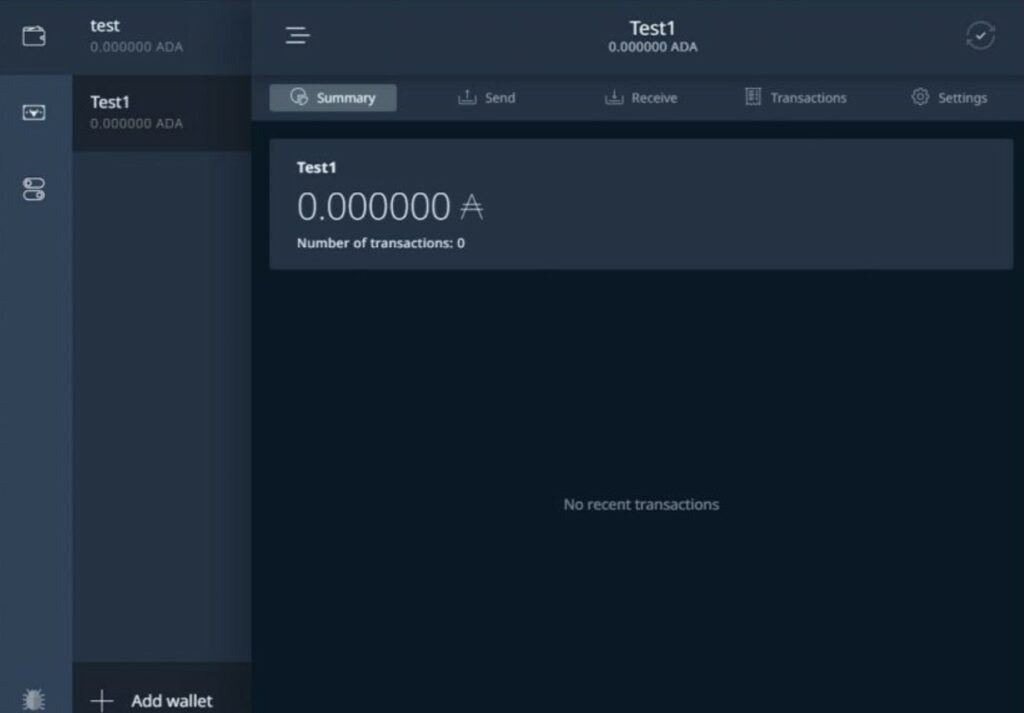 A Look At The Wallet Interface
A Look At The Wallet InterfaceNote that Daedalus is not a “lite” wallet like Yoroi, Adalite, or multi-crypto asset wallets like Exodus. Daedalus takes quite a bit of time to synchronize before use as users are downloading the entire network’s history.
Here are the key features of the wallet:
- The Daedalus wallet is free for anyone to download and use.
- Easily download and install the software with the bundled Cardano node automatically set up for use.
- Locally stored wallets and encrypted private keys- Nothing is shared with third-party servers, reducing risk and increasing self-sovereignty.
- Fully trustless operation as the locally hosted full Cardano node independently validates full transaction history of the blockchain.
- Helps support and promote the Cardano network by participating in the Cardano protocol.
- Wallet backup and restoration using mnemonic phrases, similar to other wallets.
- Delegation support.
- Supports integration with Ledger and Trezor hardware wallets.
- Open-source.
The Daedalus wallet was launched in 2015 and is supported by Input Output Global (previously IOHK). IOG is a renowned research and engineering firm that is behind the Cardano blockchain and continues to support much of the development and advancement of the project.

You can learn more about IOG, Cardano, and the founders in our Cardano Deep Dive Review.
Daedalus Supported Operating Systems
Due to the resource requirements, the Daedalus wallet has no mobile support but can be installed on desktop computers running the following operating systems:
- Windows 11, Windows 10 (64-bit)
- MacOS Big Sur, MacOS Monterey (64-bit)
- Linux OS (64-bit) tested against Debian-based, Arch-based, RPM-based
The recommended hardware requirements for running a Daedalus wallet are as follows:
- 64-bit dual-core processors
- 16 GB of RAM
- 100-200 GB of free drive space (continuously growing)
- Broadband internet connection
Daedalus Wallet Features
Daedalus has six different themes that users can choose from, allowing for personalization of the wallet appearance.
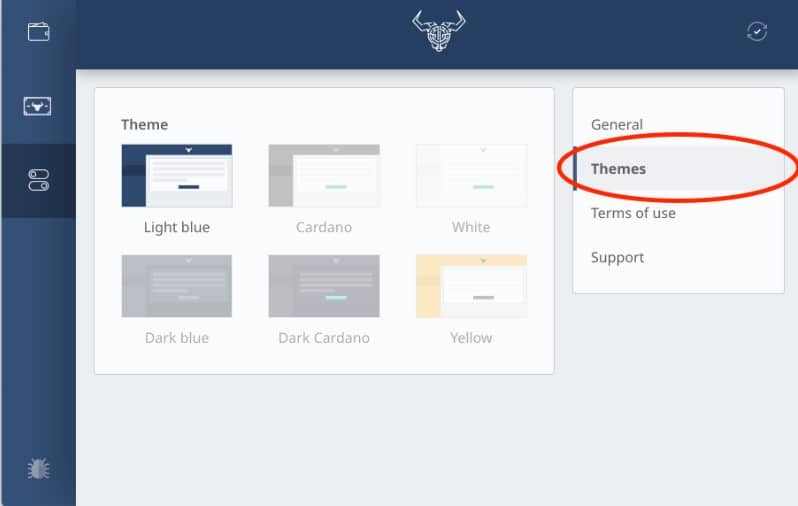 A Look at the 6 Different Themes. Image via IOHK
A Look at the 6 Different Themes. Image via IOHKThe wallet is considered highly secure as it is fully decentralized, non-custodial, utilizes advanced cryptography and encryption, and supports a full node locally on the user’s machine. Being able to stake ADA on Daedalus is also a great feature, providing users with some passive income while also contributing to, and supporting the Cardano ecosystem.
The wallet is completely open-source, checking that box for trustworthiness. Daedalus allows users to manage unlimited wallet accounts through its hierarchical deterministic (HD) wallet implementation, providing users with the ability to control their funds in an organized manner.
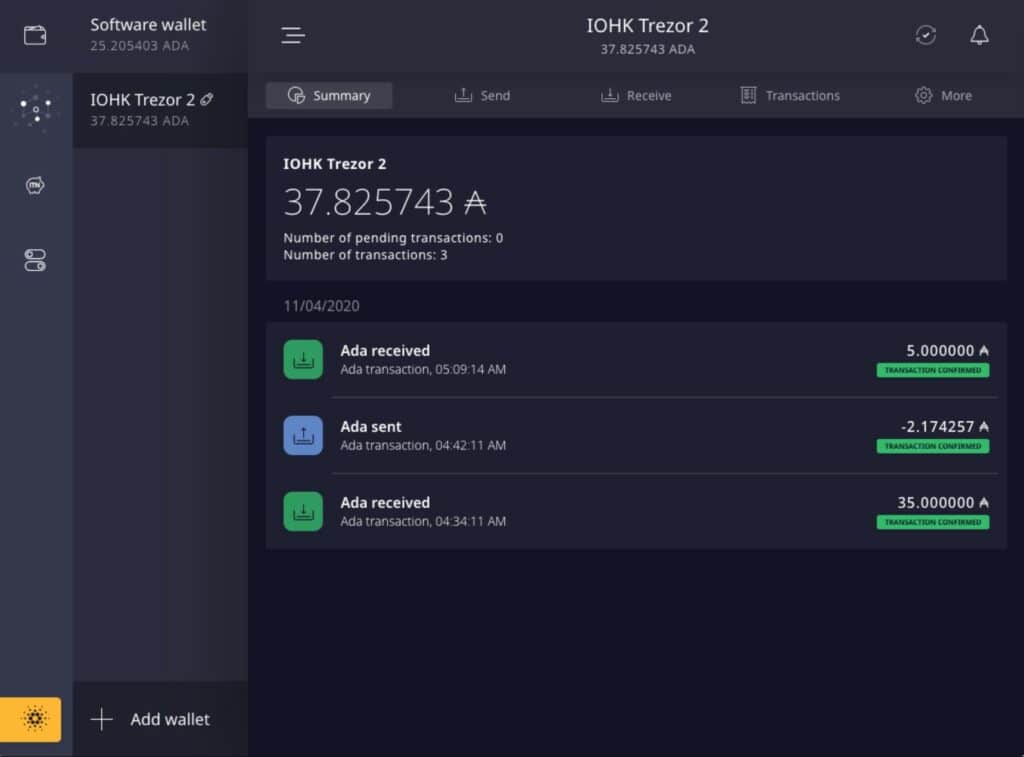 A Look at the Summary Page. Image via IOHK
A Look at the Summary Page. Image via IOHKThanks to recent wallet updates, Daedalus now supports the viewing of NFTs and Cardano tokens such as SundaeSwap and other ADA tokens. Upon the upgrade, Daedalus quickly became a very popular way for Cardano enthusiasts to securely store their Cardano NFTs.
There is no fee to use the wallet, however, as is standard with the majority of cryptocurrencies, there are standard network fees required to send transactions. Users will find transaction fees are not fixed; the wallet applies the following formula to establish transaction fees:
a + b x size (“a” and “b” are special constants).
Each transaction costs “a” amount of ADA with an additional cost of “b” amount of ADA per byte. If your transaction is 200 bytes, the fee you have to pay will be 0.155381 ADA + 0.000043946 ADA/byte × 200 byte = 0.1641702 ADA.
Daedalus Wallet Security
Since its launch in 2015, the Daedalus wallet has not experienced any breaches in security. Upon wallet setup, users can either create a new wallet, restore or import another seed phrase to import a wallet, or pair with a hardware wallet like Trezor or Ledger.
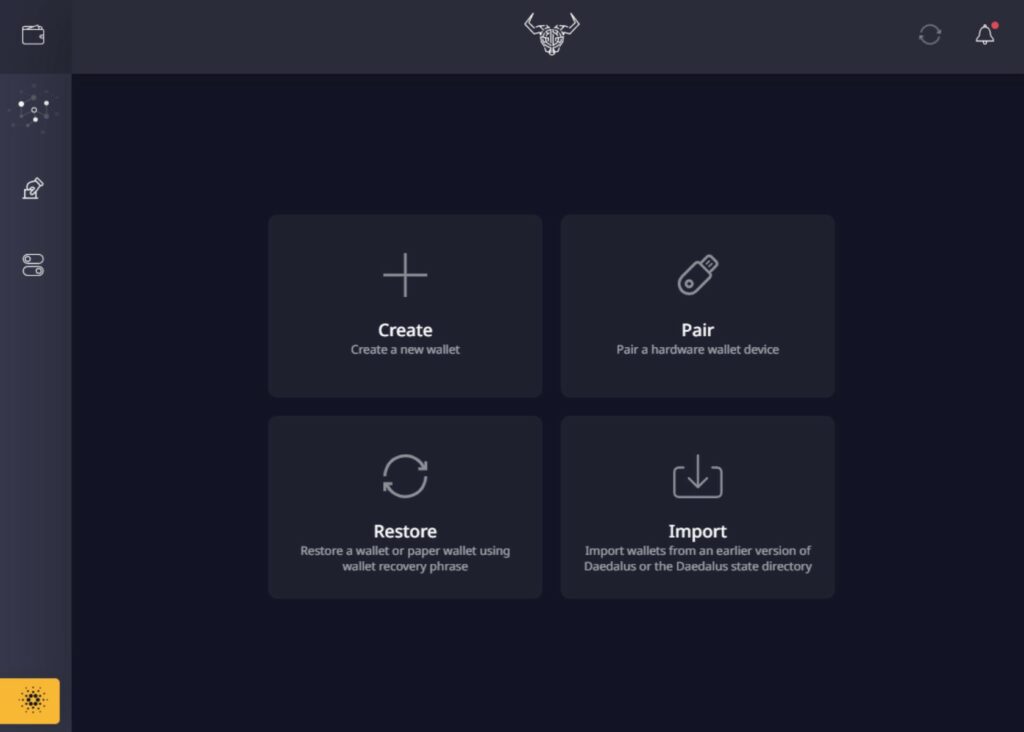 Image via IOHK
Image via IOHKUsers secure their accounts using a standard 12-word recovery phrase, similar to other wallets and can protect their wallet with a password. We cover tips and tricks for wallet security, recovery phrases, and keeping crypto safe in our article on crypto safety if you want to dive deeper into the world of crypto security and the importance of recovery phrases.

Daedalus is non-custodial, meaning that users are in complete control over their private keys, and thus, their funds, and as mentioned, the wallet is open-source and trusted by the community.
The private keys for the Daedalus wallet are stored encrypted on the user’s device to help further protect the wallet from hackers and malware, and a paper certificate export can also be created for peace of mind.
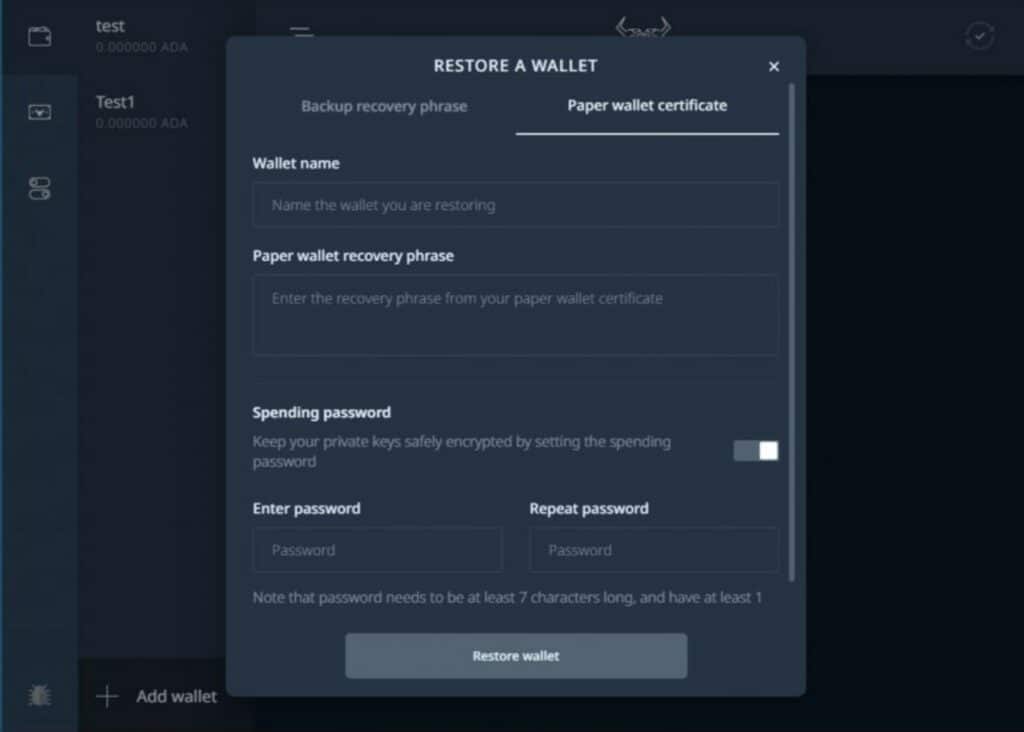 A Look at Recovering a Wallet with a Paper Wallet Certificate
A Look at Recovering a Wallet with a Paper Wallet CertificateAs with any software wallet, the security of the wallet is ultimately the responsibility of the user. Safe cyber security practices and good online hygiene are important to ensure that the computer that the Daedalus is installed on remains free of viruses or malware that could expose the wallet’s private keys to hackers.
Privacy and Anonymity
As Daedalus is a self-custody wallet, there is no sign-up or KYC needed to use the software. Daedalus users enjoy a high level of privacy and anonymity with semi-anonymous transactions.
As with most blockchains, transactions are publicly viewable, but identities are not associated with wallet addresses. Daedalus uses different addresses for each transaction, increasing the level of anonymity.
At the time of writing, there are no additional privacy features such as Coinjoin-supported transactions, but as the Cardano ecosystem develops and projects such as IOG’s Midnight are being rolled out, this will likely change and additional privacy features will most likely be integrated into the wallet.
How to Get Started with Daedalus
While the Daedalus wallet is not considered as the easiest Cardano wallet to use and it attracts advanced users, setup and use are still quite simple and can be done in 3 basic steps:
- Download and install the wallet
- Back up the randomly generated and unique 12-word recovery phrase that will come with the wallet, or import a different wallet
- Create a password to secure it against unauthorized access.
To download the desktop version for any operating system, visit daedaluswallet.io/downloads, which will take you to this screen:
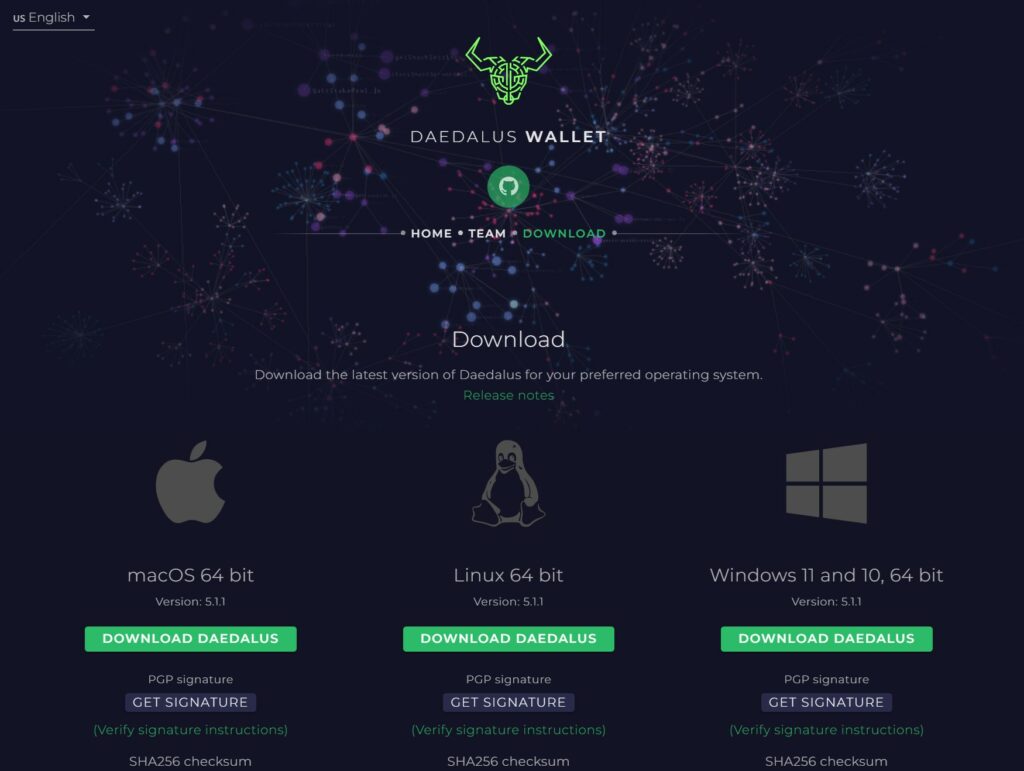 Image via Daedalus
Image via DaedalusHere you will find downloads for Windows, Mac, or Linux. Download the software compatible with your device and install it.
Once the download is complete, you will open it up, fill in some basic information such as preferred language, number/date/time format, and read and agree to the terms and conditions.
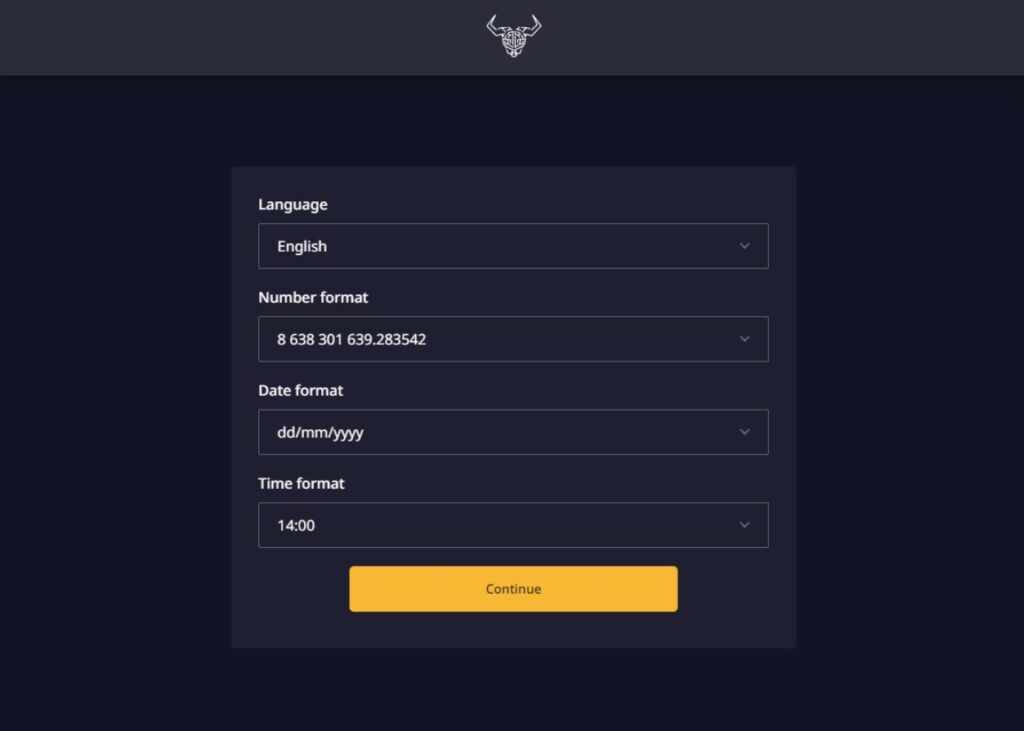 A Look at the First Setup Screen.
A Look at the First Setup Screen.Next, as Daedalus is a full-node wallet, you must allow it to synchronize with the Cardano Blockchain. This can take quite a bit of time, just kick back and let it do its thing.
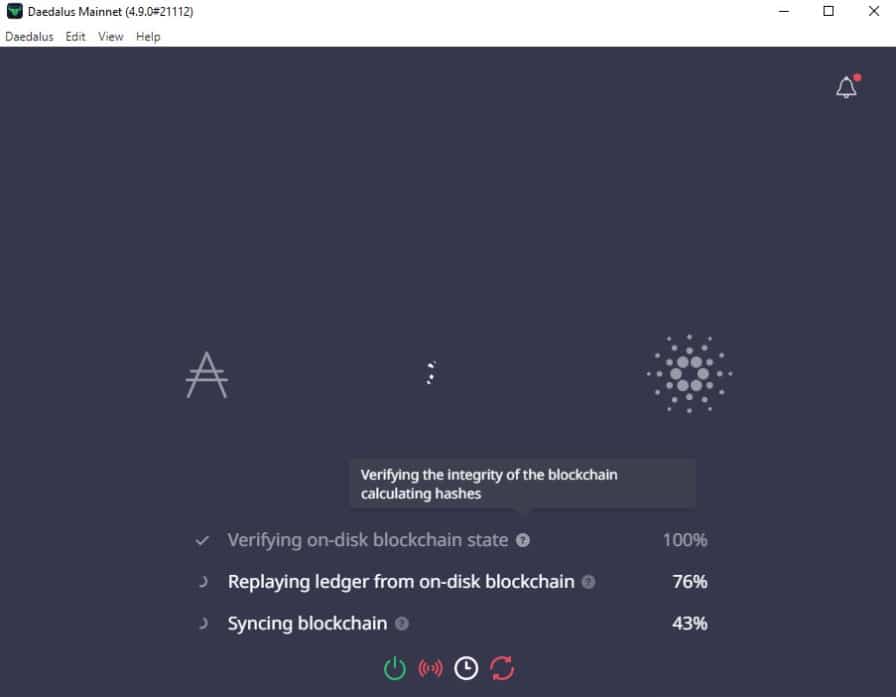 A Look at the Synchronization Screen. Image via IOHK
A Look at the Synchronization Screen. Image via IOHKNow you will be able to select “create new wallet”, “Import wallet,” “Pair”, or “Restore.” If you select “create new wallet,” you will enter a wallet name and activate it by entering the randomly generated 12-word seed phrase and setting a password for extra security.
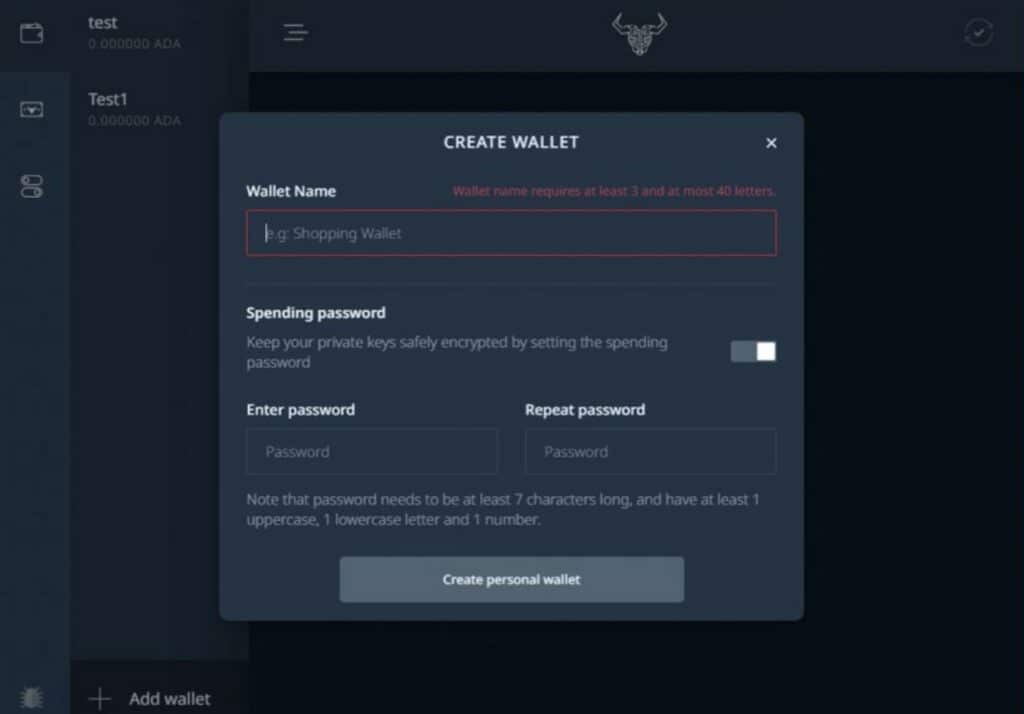 Naming the Wallet and Setting the Password
Naming the Wallet and Setting the PasswordHere is where the ever-important step of backing up that recovery seed phrase comes in. It is important to stress the importance of these words. If your computer breaks or is lost, this seed phrase will be the only way to recover your crypto on another device.
It is important that this seed phrase is written down and never stored online where hackers can access it. Most users write these words down on a piece of paper and store it someplace securely, but I recommend using a fire and waterproof metal seed phrase protector for added security.
You can learn more about this “most important step in crypto” in our article on How to Store Crypto Safely.
Once you have that seed phrase backed up you are good to fund your wallet and start using it.
Usability
The wallet is user-friendly, well-designed, and simple to navigate, and the sharp-looking interface makes using the wallet an enjoyable experience. Overall, the UX/UI is intuitive and well laid out, making Daedalus suitable for both beginner and advanced crypto users.
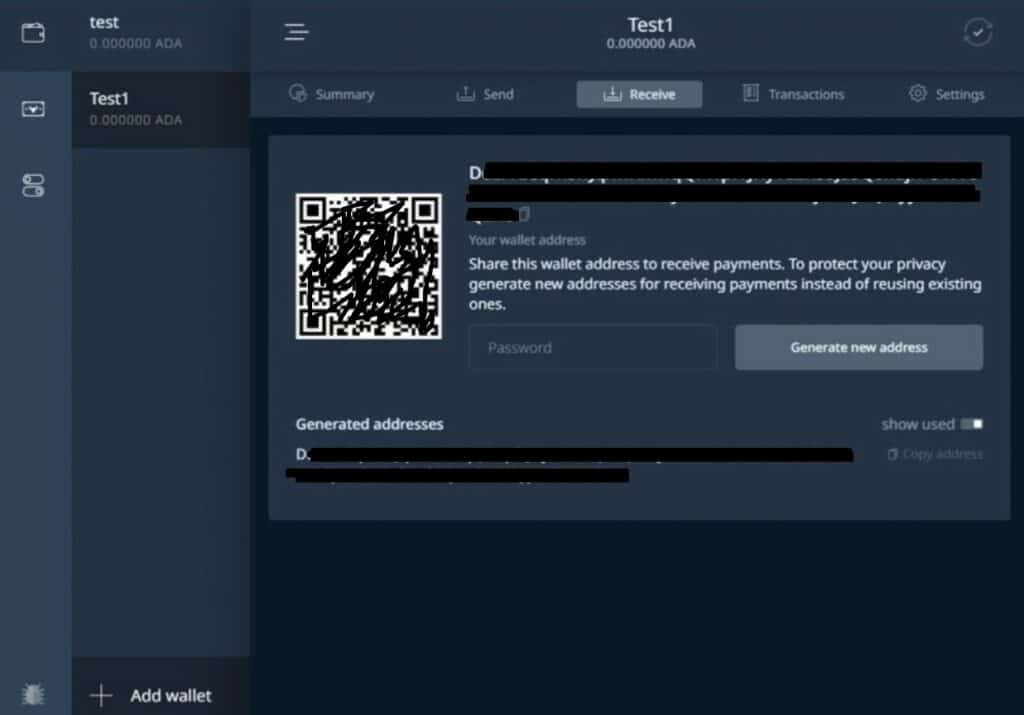 A Look at the Receiving Screen
A Look at the Receiving ScreenThough the Daedalus is a software wallet, which is not as secure as hardware wallets, security-minded users will be happy to note that both Ledger and Trezor hardware wallets can integrate with Daedalus, increasing the security.
Upon first opening the wallet, you will see the wallet landing page which shows the amount of ADA you have, as well as the basic functions of the wallet. These are displayed along the top and have options for sending and receiving, transaction history, and settings.
The sidebar will show further options including an add wallet function, restore a wallet, and a newsfeed navigation icon.
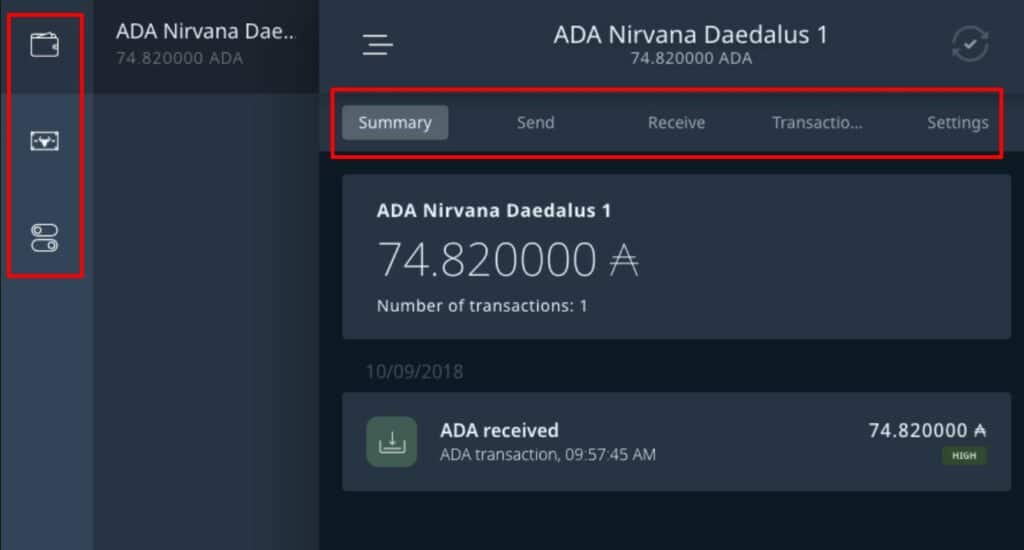 Image via IOHK
Image via IOHKThere is also an option to upload ADA under the “ADA redemption” tab. Here users can upload a certificate or paste in a redemption key to show any ADA that may have been purchased via other avenues. Users can also redeem paper vended and force vented ADA into the wallet.
How to Make a Cardano Paper Wallet with Daedalus
You can use the Daedalus desktop wallet to also generate a paper wallet if you’re looking for the security offered by this form of cold storage. You can then store this paper wallet in a secure offline location like a bank vault for long term hodling.
To create a paper wallet using Daedalus follow these steps:
Download and install Daedalus;
Once installed launch Daedalus and click “create a paper wallet certificate”;
A dialogue will open allowing you to click “Save PDF for printing”;
After saving the PDF another dialogue is generated asking you to verify the printed certificate;
You’ll receive a twenty-seven-word recovery phrase, with eighteen words printed on the paper wallet, while the final nine will need to be recorded by you. View the checklist, check them all off and click ‘Continue’;
The next screen asks you to complete the certificate. Click ‘Continue’;
Next, you’ll set your password recovery phrase, check the checklist, and click ‘Continue’ once more;
Finally, you will see a screen that says “Paper Wallet Certificate” where you can click ‘Finish’ to generate the paper wallet.
The printed paper wallet looks like this:
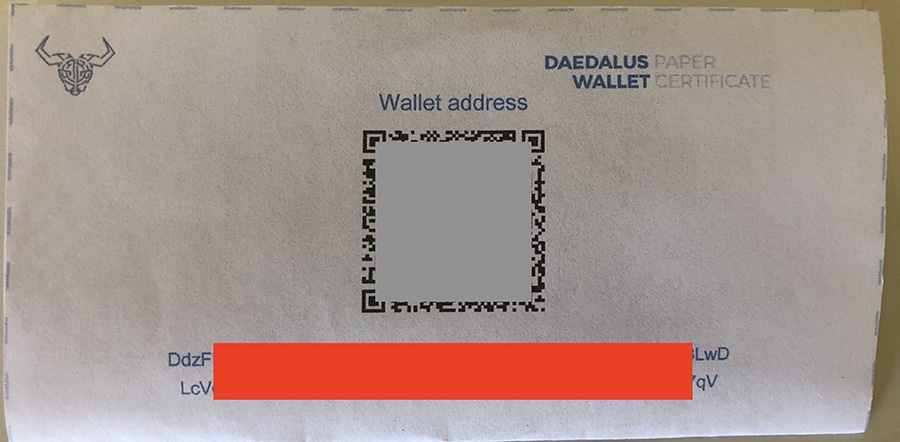 Daedalus Paper Wallet
Daedalus Paper WalletThe paper wallet feature improves security as the printed certificate cannot be cached by the printer or compromised in some other way. Paper wallets can be restored and brought back online with Daedalus.
Of course, there are other risks that come with paper wallets that you have to take into account. These are risks that come with the physical nature of it. It can be lost, stolen or destroyed. So you should only go with a paper wallet if you are going to place it in secure cold storage.
Daedalus Support
Daedalus has a support team that can be accessed via a ticketing system from the wallet. The website also has a very well-populated FAQ and self-help section that is a handy resource for users seeking answers and troubleshooting steps.
Daedalus also has a decent community on Reddit where users can reach out if they have questions. Just be careful when seeking any crypto-related assistance from any social media platform as a very common scam is where someone will message you, pretending to work for the company support team and ask for your recovery phrase.
No support team for any crypto project will ever ask for your recovery seed phrase, be sure to keep this private and offline at all times. Whoever has these words can steal your crypto.

Daedalus Wallet Review: Conclusion
The Daedalus wallet is fantastic for fans of the Cardano ecosystem and is one of the most advanced and secure wallets for that network.
Users who do not want to run their own node or don’t have the hardware requirements or free disk space will likely prefer the Adalite or Yoroi wallets. Users seeking multi-coin support or mobile wallets will likely opt for a different wallet. I recommend checking out our article on the Best Software wallets if you want to explore additional options.
Daedalus is multi-functional and provides a highly secure and convenient place for users to store their Cardano NFTs and assets. Thanks to the full-node support, Daedalus users enjoy an additional level of independency when transactions are validated and verified, plus users can enjoy knowing that they are contributing to the robustness of the Cardano network.



